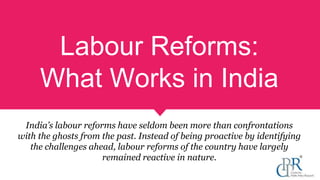By Dr. Gyan Pathak
India is moving fast with its intention of implementing the next phase of labour reforms. Digital bases are being put in place, that may ultimately pave the way for smooth transition to new labour code regime, implementation of which is likely to be announced soon, though it is generally considered to be a minefield that would be very problematic to navigate by both workers and employers. Both the stakeholders are yet not ready to the occasion, though Centre and the majority of States and UTs are ready with their laws required for implementation.
The latest few moves of the Centre indicate in this direction. It has already put eShram portal for migrant and informal workers, and directions have already issued to Ministries and Departments to ensure payments of subsidy and incentives to beneficiaries of the welfare schemes through Aadhar Payment Bridge.
Under the Aadhar Payment Bridge, Central Government has earlier ordered the ministries and departments to ensure 100 per cent Biometric Aadhar Authentication. Now, it has ordered the Employment Provident Fund Organisation (EPFO) to ensure employers to complete the first stage of the process of Universal Account Number (UAN) activation through Aadhar-based OTP by November 30, 2024, starting with the latest joinee employees in the current financial year 2024-25. In the second stage of the process, going forward, UAN activation will include the state-of-the-art facility of Biometric authentication, through Face-recognition Technology.
Thereafter, the Employers are required to complete the process for all employees working with them. It is part of the EPFO reform that is required to ensure that maximum number of employers and employees benefit from the Employment Linked Incentive (ELI) Scheme announced in the Union Budget 2024-25.
It is in this backdrop, the Ministry of Labour & Employment has directed EPFO to work in a campaign mode with Employers and ensure activation of Universal Account Number (UAN) of employees. EPFO, in their turn, will involve their zonal and regional offices for effective outreach.
The Union Ministry of Labour& Employment has said that using Aadhar as an identity document simplifies government delivery processes, enhances transparency and efficiency, and ensures beneficiaries receive their entitlements seamlessly. Aadhar-based verification eliminates the need for producing multiple documents to prove one’s identity.
Three schemes A, B, and C were launched in the Union Budget 2024-25 to give Rs10,000 crore subsidies to employers under ELI scheme through EPFO for every new membership, and it was claimed that it would generate 8 million jobs, apart from skilling 10 million youths over the next five years.
EPFO has just celebrated its foundation day, and on that occasion, the Union Ministry of Labour and Employment had said, “India’s economy is currently undergoing a transformative shift marked by an increasing trend toward formalization—a process that is redefining job structures, employment security, and social benefits for millions. This change is of profound importance for India’s workforce, as it ensures that a larger segment of the population is covered by social security systems, offering them greater economic stability and a more secure future.”
The process of creating a digital base for entire informal and formal workforce in the country is likely to make the transition from the old labour laws regime to the new labour code regime a little smoother. PM Narendra Modi has already labelled the new labour codes as the largest labour reform in India since independence, which according to him would benefit both the employees and employers – employees with better working conditions and employers with ease of doing business.
Nevertheless, transition is not likely to be smooth on account of fear of new problems that the implementation of the codes would bring to both the stakeholders – the employees and employers. The joint platform of the 10 Central Trade Unions (CTUs) has been agitating against the four labour codes since PM Modi government had got them passed – Code of Wages in 2019, and Industrial Relations Code, Code on Social Security, and Occupational Safety, and Health and Working Conditions in 2020. Government supported Bharatiya Mazdoor Sangh (BMS) has also reservations on certain provisions of the codes which they say need further discussion before implementation.
As for the Employers, navigating from old labour laws regime to the new labour codes regime would not be smooth either, though the new four codes were prepared by subsuming 29 of the 44 labour related laws to make doing business easier. Barring the big Corporate companies, all other companies would have to undergo numerous problems while implementing the new labour codes, since they would require to identify and make arrangements as per the new laws involving funds to deal with the complexities in compliance and the new possible legal pitfalls.
The EPFO, ESI, and eShram platforms have already displayed considerable level of problems in implementation of the new direction of the Central government. States and UTs will also be required to make enough arrangements in terms of skilled manpower, digital space for themselves, and effective implementing machinery.
Nevertheless, the fast-changing world of work will compel all stakeholder to adopt to the new realities on the ground as far as fast emerging new Employment regime is concerned that heavy relies on technology and Artificial Intelligence. Even the four labour codes are almost five years old during which the world of work has drastically changed, requiring further tweaks in the codes themselves. Foolish implementation of the codes without suitable changes to meet the challenges of the fast changing world of work after COVID-19 crisis of 2020 could be disastrous.
The joint platform of CTUs is still threatening strong protest agitation against implementation of the labour codes, including all India strike action. Employers may face pressures from the government to implement the new laws on the one hand and from agitating workers on the other. (IPA Service)

 Delhi Citizens Must Demand Firm Actions On Ensuring Clean Air Before Polls
Delhi Citizens Must Demand Firm Actions On Ensuring Clean Air Before Polls 